- Home
- Alex Hughes
Marked
Marked Read online
PRAISE FOR THE NOVELS OF ALEX HUGHES
Sharp
“If you like a futuristic murder-mystery-driven world, with a male protagonist that definitely has his share of woes and mystery, give this series a shot.”
—Smexy Books
“A mash-up of a noir detective series with supernatural elements . . . a wonderful genre blend of old-style detective stories and supernatural with a flawed hero and a fascinating take on a world that outlaws technology.”
—All Things Urban Fantasy
“A grim and gritty police detective series, with a bit of science fiction mixed into an almost pulp-noir setting . . . a great series for both mystery lovers and those that enjoy a bit of sci-fi.”
—News and Sentinel (Parkersburg, WV)
“An emotional story fraught with danger.”
—Night Owl Reviews
“[Adam] is very well developed and written. Fans of Jim Butcher will enjoy this series.”
—USA Today
Clean
“I am addicted to this world, this character, and this writer. Alex Hughes spins stories like wizards spin spells . . . a stellar debut!”
—James R. Tuck, author of the Deacon Chalk series
“A fun blend of Chinatown and Blade Runner.”
—James Knapp, author of State of Decay
“[A] tightly written futuristic detective story set in an alternate Atlanta. . . . This crisp debut marks Hughes as a writer to watch.”
—Publishers Weekly
“Really well done.”
—USA Today
“I didn’t want to stop reading.”
—Smexy Books
“[A] fast-paced sci-fi yarn. . . . Reminds me very much (and very fondly) of Jim Butcher’s Dresden Files.”
—SF Signal
“An excellent start on a series . . . so many twists, turns, and double-crossings. . . . I’m going to be first in line for the next novel in this Mindspace Investigations series.”
—Night Owl Reviews
“Fans will want more by Alex Hughes.”
—SFRevu
ALSO AVAILABLE BY ALEX HUGHES
Clean: A Mindspace Investigations Novel
Sharp: A Mindspace Investigations Novel
Payoff: A Mindspace Investigations Novella (A Penguin Special)
MARKED
A MINDSPACE INVESTIGATIONS NOVEL
Alex Hughes
A ROC BOOK
ROC
Published by the Penguin Group
Penguin Group (USA) LLC, 375 Hudson Street,
New York, New York 10014
USA | Canada | UK | Ireland | Australia | New Zealand | India | South Africa | China
penguin.com
A Penguin Random House Company
First published by Roc, an imprint of New American Library,
a division of Penguin Group (USA) LLC
Copyright © Alexandra Hughes, 2014
Penguin supports copyright. Copyright fuels creativity, encourages diverse voices, promotes free speech, and creates a vibrant culture. Thank you for buying an authorized edition of this book and for complying with copyright laws by not reproducing, scanning, or distributing any part of it in any form without permission. You are supporting writers and allowing Penguin to continue to publish books for every reader.
REGISTERED TRADEMARK—MARCA REGISTRADA
ISBN 978-0-698-13820-9
PUBLISHER’S NOTE
This is a work of fiction. Names, characters, places, and incidents either are the product of the author’s imagination or are used fictitiously, and any resemblance to actual persons, living or dead, business establishments, events, or locales is entirely coincidental.
Version_1
Contents
Praise
Also available by ALEX HUGHES
Title page
Copyright page
Dedication
Epigraph
CHAPTER 1
CHAPTER 2
CHAPTER 3
CHAPTER 4
CHAPTER 5
CHAPTER 6
CHAPTER 7
CHAPTER 8
CHAPTER 9
CHAPTER 10
CHAPTER 11
CHAPTER 12
CHAPTER 13
CHAPTER 14
CHAPTER 15
CHAPTER 16
CHAPTER 17
CHAPTER 18
CHAPTER 19
CHAPTER 20
CHAPTER 21
CHAPTER 22
CHAPTER 23
CHAPTER 24
CHAPTER 25
About the Author
To Sam, who makes it all possible. Thank you, my love.
“Once a telepath or any person with Ability
is accepted by and accepts the Guild,
he belongs to the Guild for the remainder of his life.
He no longer pays taxes to any nation-state;
he is not subject to its laws, cannot be tried
in any court, and cannot accept employment
except by consent of the Guild.”
—Koshna Accords, section 33,
paragraph 4.3, sentence 1 (called the
“Once Guild Always Guild” section)
CHAPTER 1
Lying in a society of telepaths was possible, but just barely. The key was not to think about the lie at all—something akin to spinning a plate on top of your head while standing on one foot and reciting multiplication tables—or to lie to yourself first, and often. The frightening thing was how often someone got away with it. The even more frightening thing was that lying well—and being caught at it—seemed to give a certain cache to the telepath involved, and more often than not came with job offers.
In the world of the normals this was also true, though lying wasn’t as hard if you didn’t have to do it mind-to-mind. Politicians seemed to get reelected more readily after a good lie, bureaucrats seemed to thrive on them, and in my job, contractor interrogator for the DeKalb County Police Department, a good lie to a suspect would get you anything you wanted. I was learning to lie well to the suspects. The trouble was, nearly everyone I met these days was suspect in one way or another.
• • •
Homicide detective Isabella Cherabino stuck her head in the door. “We have a murder, Adam.”
“Oh, goody,” I replied.
She looked at me.
“You realize I’m in the middle of an interview,” I said. I helped her out on murder cases, but I was technically employed as an interviewer. The interview rooms were supposed to come first.
“You have ten minutes,” she said, and closed the door behind her as she left.
I turned back to the suspect, a thirtysomething housewife accused of auto theft. “You know, I’m a Level Eight Guild–trained telepath,” I said conversationally.
Exactly nine minutes later, she had just finished explaining how she subverted the cars’ antigravity engine lock systems, and how none of the crew she used appreciated her. I made all the right noises, and she finished the confession with times and dates. Finally she looked up with bloodshot eyes and asked me quietly, “Do you think I need a lawyer?”
“I certainly don’t know what to think,” I said, the standard answer. I went to find a police officer to go sit with her. The empty spot in the room behind me, the spot that would have been Officer Bellury’s if he were still alive, seemed to echo. Not only did I need another person to do paperwork if I wasn’t going to be here, but it would be nice to have a witness who could testify in court. I was a convicted ex-felon (drug charges only, and more than t
hree years clean out of rehab), and while a video of a confession would hold in court regardless of the interrogator, I certainly couldn’t testify. Credibility and all that. Besides, any day that I spent with Cherabino was a good day. I even liked helping with the murders.
• • •
One of the secretaries found me on the way out and handed me a message slip.
Kara, it read. Call Kara Chenoa immediately. Emergency.
“Immediately” was underlined three times.
Kara had been my fiancée once upon a time, well, until she’d reported me to the Guild for the drug habit that had gotten me kicked out more than ten years ago. These days we were on decent terms—well, when I didn’t think too hard about the past. She had moved up in the Guild since we’d been together, to the position of attaché to the city, and she helped me with the occasional case I needed Guild information from. In exchange I tried not to resent her new job and new husband. Kara wasn’t given to hysterics. If she said emergency, it was.
“Are you coming or not?” Cherabino asked, literally tapping her foot in impatience.
“Yeah,” I said distantly. “I’m going to need a phone.”
“I need to get to the crime scene before Bransen docks me for overtime for the Forensics techs. There will be a pay phone close by. After you do your reading mumbo jumbo.”
My attention turned back to her. “It’s highly delicate, trained analysis of what the victim left behind in Mindspace, not mumbo jumbo.”
“Don’t be touchy.”
I made a frustrated sound and trotted after her. She was in one of her moods, clearly.
Cherabino hustled down the main floor of the DeKalb County Police Department, the secretaries busy in the large pool to the left, the suspects screaming in a long line in front of Booking to the right, citizens waiting in front of Reception to the front, near the doors she was headed to. The ordered chaos was home. This job, even with all the stress and the budget cuts, was part of what kept me sane and on the wagon. It helped that they refused to give me pay directly, so I had nothing to buy my drug with.
“Where’s Michael?” I asked. Michael was a wiry Korean guy with a calm personality and a close-cut haircut, a new detective she’d promoted up out of uniforms when he’d helped with a case. He’d proven invaluable, even if he and I had tension sometimes. He was just so . . . nice. I didn’t know what to do with nice.
Cherabino held the door for me. “He’s getting the car.” In that moment, I got a whiff of impatience along the mental Link between us. I’d established a bridge between our minds by accident during an earlier case, and she still wasn’t quite comfortable with it. In fact, she wanted it gone as quickly as possible, and told me so. Often.
“What?” she asked, as I stood there too long.
• • •
Michael landed the car up to the front of the station with a small squeal of an abused anti-grav system. Cherabino’s method of driving must have been wearing off on him; he used to be a great deal safer.
Moving quickly to get out of the cold November wind, we piled in the car, Cherabino in the front, me exiled to the back with the fast food wrappers.
Cherabino shielded mentally, using the technique I’d shown her to block me out of her mind, long rows of bricks going up between us. But she left one little brick unset, so I could still feel the edge of her presence like a dim beam of light landing on the floor of my mind.
I held on to that light like a lifeline. It hadn’t been so long ago that I had felt nothing but her mind over the Link; I’d injured my mind in a life-and-death confrontation with a suspect, and it had taken a couple of months to heal fully. That is, if it was, in fact, fully healed.
I put my seat belt on. Michael flipped the sirens on and accelerated. He obeyed most traffic laws most of the time, and had lights and sirens on when he did not. I’d only feared for my life once total when he was driving, and that hadn’t been strictly his fault.
To distract myself—a pillar of strategy in the Twelve Steps—I asked Michael, “What do we know about the victim?” He was still connected to his old network as a beat cop; plus he had a knack for research and detail that wouldn’t quit. If there was something to be known at this stage, he would know it.
Also, I added, “Thanks for driving.”
“Just a second.” Michael cut through smaller city streets, found a skylane entrance—an actual official entrance—and squeezed around a car stopped to let him by. He settled into the upper, mostly empty, skylane with plenty of room to spare for the floating anti-grav markers, and only then started to talk.
“Victim is Noah Wright, a sixty-seven-year-old white male, unemployed, found at home. First officer on the scene indicates extreme violence.”
“Blunt-force trauma? Gun?” Cherabino asked. “What is ‘extreme violence’ exactly?”
I sighed. I hated the messy scenes.
“Officer at the scene indicates a small fire ax found on-site and no further details. I’m betting the violence was with the ax or she wouldn’t have mentioned it. The ME is running late, so we’ll likely have to make the initial call.”
Cherabino huffed. “Why call for a senior detective?”
“The lieutenant didn’t tell me,” Michael said. “It could be the violence level.”
They talked about that for a minute, and Cherabino asked another question about the scene.
• • •
“Adam!”
“What?”
“We’re here,” Cherabino said.
“Oh,” I said, and started paying attention to the surroundings. Crime scene, after all. And I was still on the clock, still being paid for this, for better or for worse. I needed to do my job, especially since the budget crisis meant if I didn’t, I’d be on the street. I might be anyway, if a miracle didn’t arrive.
We were in a small driveway in a small lot on a row of identical small boxy brick houses. They had different-colored doors, and a few flags hung from doorposts, touting different political stances. Block parties must be interesting in this neighborhood.
The house had patchy grass, and a different-colored roof and door than the rest. Otherwise, it was the same boxy brick house with one window up front that everyone else had. This one didn’t have bars on the windows.
We pulled in, a police cruiser parked crooked on the driveway in front of us, its undercarriage flashing with the occasional burst of orange light, the whine you could hear in the air saying its anti-grav hadn’t been properly shut down. The officer would be lucky to get it working again with a good mechanic and a hefty bill; if not, he’d be grounded and his wages garnished until the department could afford to fix it.
Next to the cruiser was a huge metal structure, burnished bronze and discolored steel, what might have been a weather vane designed by an antiestablishment artist on a strong drug. It flashed in time with the cruiser’s light. Maybe an electrical field at play or some kind of quantum property that entangled to the cruiser’s engine and caused the mechanical trouble. Either way I stayed well clear.
“You okay?” Cherabino asked.
“Yeah,” I said and got out of the car next to her.
Even though the wind was bitterly cold, the concrete pathway was warm, some kind of deicing setup I could feel even through the shoes. There were small metallic flowers holding lights along the walkway, and the overhanging roof was made out of some kind of supermaterial with an odd snakeskinlike grain. There was more money and thought put into this boxy brick house than was obvious. The door was patterned with overlapping metalwork, like a mosaic out of similar colors of metal, something you could only see when you got up close.
I noticed two camouflaged spy holes set into the door, and when I looked up, two small overhanging boxes. They could have been cameras, I supposed, but they had grates at the bottom. Delivery system for some kind of gas, perhaps, or fine-grade
projectiles? Cherabino saw where I was looking and swallowed.
“Gotta love post–Tech Wars architecture,” I said.
“Well, at least we know he knew his killer.” Cherabino shrugged. “Either that or the killer broke in the back.” She turned the handle and we went in, Michael trotting past the apparent kill zone in the doorway all too fast.
Inside was plush carpet and old furnishings, the wallpaper a graphic print popular twenty years ago, dated and old to my eyes. Faux aged-wood panels took up the entire covering of the hallway to the right, a kitchen ran off to the left, and ahead and in front between an outdated couch, a chair, and several small side tables. An ax lay to one side, the kind you’d cut firewood with, the handle stained with brown, something dried and leathery stuck to its edge. A puddle of fresh-smelling vomit sat a few feet outside the blood spray, near the couch.
I walked closer in. Sprays of blood and gore had splashed up on the furniture, a few hitting the walls—one on an abstract painting like an emphasis note. The body—I looked for a moment, then looked away.
We were here before Forensics. The blood was dry, but I didn’t smell decomposition; he’d been dead a day or two at the most. I held my shields tightly; with this level of violence, it wouldn’t be a fun scene to read mentally either.
The back door looked intact to me, but I was sure it would be checked and rechecked. I noticed a phone in an alcove in the kitchen. A phone I could use to call Kara later, if I managed to dodge Cherabino long enough.
Cherabino sighed and pulled out disposable booties. “Michael, why don’t you start a sign-in sheet for the scene? And you,” Adam, her mind echoed, “you see if you can find the officer who left the car out front and yet is not with the body.”
“Oh. Yeah.” I lowered my shield enough to skim the top layer of Mindspace—trying to ignore the death hole sitting in the middle of the room—looking for minds. I found one feeling very sick in the rightward direction. I followed the mind like a beacon and found myself outside a bathroom with an open door. A female cop in uniform knelt in front of the toilet.

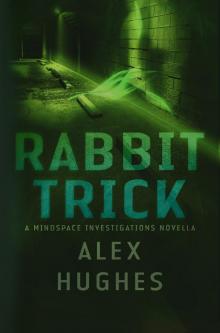 Rabbit Trick: A Mindspace Investigations Short Story
Rabbit Trick: A Mindspace Investigations Short Story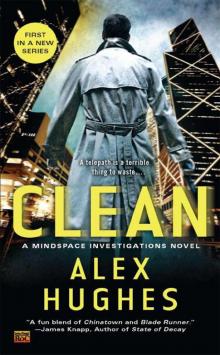 Clean: A Mindspace Investigations Novel
Clean: A Mindspace Investigations Novel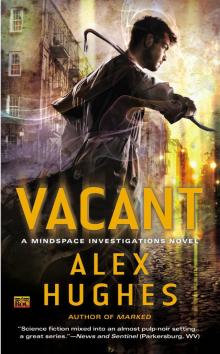 Vacant
Vacant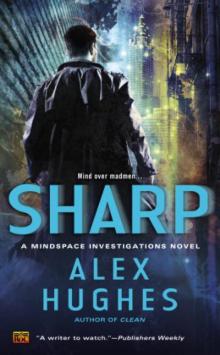 Sharp: A Mindspace Investigations Novel
Sharp: A Mindspace Investigations Novel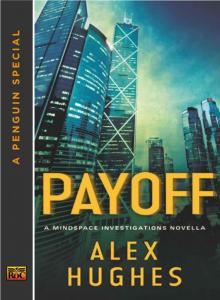 Payoff
Payoff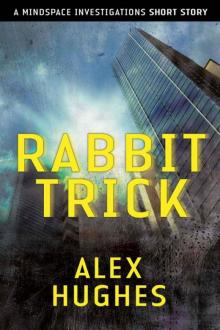 Rabbit Trick: A Mindspace Investigations Novella
Rabbit Trick: A Mindspace Investigations Novella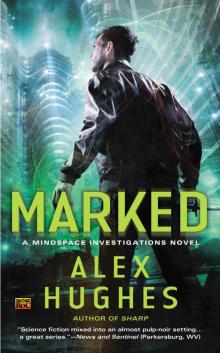 Marked
Marked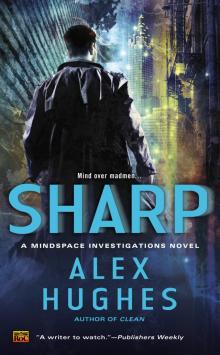 Sharp
Sharp